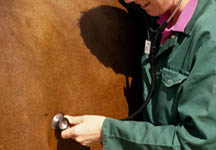Following an initially “weak response” to the emergence of equine infectious anaemia (EIA or swamp fever) in the south-west last year, the local Animal Health team has asked riders how they can do better.
Ministry vets and Trading Standards officers met riders last week in the first of a series of workshops organised by Defra’s Animal Health and Veterinary Laboratories Agency (AHVLA).
The initiative by Dorset Trading Standards and AHVLA Southwest follows the “lessons learned” document produced by Defra (news, 21 April) after three outbreaks of EIA in 2010.
Ben Goddard of AHVLA Southwest said: “Having EIA in our area last year made us realise that we don’t know that much about the [local] equestrian community or how to make contact with them, and that our vets are more used to handling farm animals than horses.”
Officials had trouble finding out where horses were kept in the areas around infected farms — resorting to using a helicopter to spot horses from the air and then visiting those premises.
Neil Martin of Dorset Trading Standards added: “We have plans to deal with all disease, but the one for EIA was not detailed and we felt our response [to the first incident] was a little weak.”
Christine Scott of Dorset Trading Standards told H&H: “People with equine experience tend to deal with calls to horses, so a day like this is very helpful.”
In the afternoon the equine experts, from the British Horse Society and World Horse Welfare, were asked to advise AHVLA on how equine disease outbreaks can be better dealt with.
Issues included improving the National Equine Database, adding factsheets about spotting equine disease to the Defra website and making passport updates, like changes of ownership, easier.
This news story was first published in the current issue of Horse & Hound (19 May, 2011)


